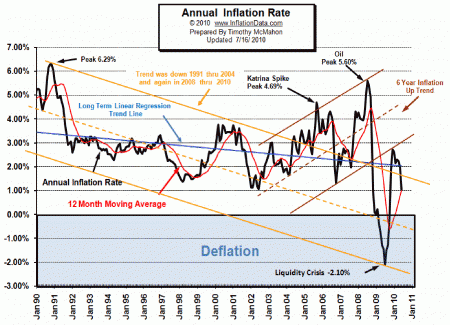Inflation Definition. Inflation is a term that relates to a general rise in the price level of goods and services, measured by a price index, which leads to a decrease in the purchasing power of money. Central bank policies in most of today’s world have been expressly directed at minimizing “price inflation” and preventing the development of “Asset bubbles”. A subset of inflation is “Asset price inflation”. Asset price inflation is an economic phenomenon denoting a rise in price of assets, as opposed to ordinary goods and services. Typical assets are financial instruments such as bonds, shares, and their derivatives, as well as real estate and other capital goods. The best example is the housing market, which concerns almost every individual household, where house prices have over the past decade consistently risen by or at least near a two digit percentage, far above that of the consumer price index. This in turn, reduces, often substantially so, the disposable income of ordinary households, even in the absence of price inflation, but with the same outcome in the end. The Consumer Price Index, or CPI, is an index of the cost of all goods and services to a typical consumer. The chart below summarizes past history.

Forextraders' Broker of the Month
BlackBull Markets is a reliable and well-respected trading platform that provides its customers with high-quality access to a wide range of asset groups. The broker is headquartered in New Zealand which explains why it has flown under the radar for a few years but it is a great broker that is now building a global following. The BlackBull Markets site is intuitive and easy to use, making it an ideal choice for beginners.
